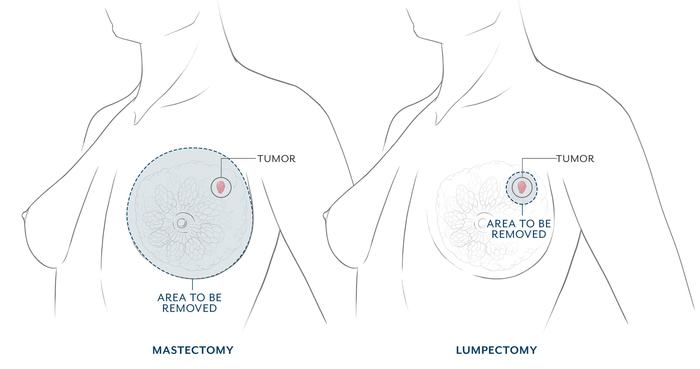When facing breast cancer surgery, the decision between a lumpectomy (breast-conserving surgery) and a mastectomy (complete removal of breast tissue) can feel overwhelming. Both options come with their pros, cons, and emotional considerations, and the choice depends on various factors, from the size of the tumor to personal preferences. Let’s walk through the differences, advantages, and considerations in a conversational tone.
What Are the Basics?

A lumpectomy is a surgery where only the tumor and a small margin of surrounding tissue are removed. This option is often recommended for smaller, early-stage cancers. On the other hand, a mastectomy involves removing all the breast tissue and sometimes the skin, nipple, and areola, making it more comprehensive.
Why Does the Choice Matter?
Here’s the thing: Both surgeries can be equally effective in treating breast cancer when paired with the right follow-up treatments. Studies show that survival rates for lumpectomy with radiation and mastectomy are about the same for early-stage breast cancers. So, the decision often comes down to what’s right for your body, lifestyle, and mental well-being.
Let’s Compare Lumpectomy and Mastectomy
| Feature | Lumpectomy | Mastectomy |
|---|---|---|
| Amount of Tissue Removed | Only the tumor and a small margin of healthy tissue. | Entire breast tissue, and possibly skin, nipple, areola, and lymph nodes. |
| Hospital Stay | Typically an outpatient procedure; you can go home the same day. | Often requires at least one overnight stay. |
| Recovery Time | 2–3 weeks. | 3–6 weeks, longer if reconstruction is done simultaneously. |
| Radiation Therapy | Almost always needed for 6–8 weeks post-surgery. | Sometimes avoided, depending on the stage and margins. |
| Cosmetic Outcome | Preserves most of the breast, but shape may change. | Reconstruction options available, but sensation and original appearance are often lost. |
| Risk of Recurrence | Slightly higher chance of local recurrence. | Lower chance of local recurrence but does not eliminate risk of distant recurrence. |
Why Choose a Lumpectomy?
A lumpectomy is often ideal for:
- Small, localized tumors (less than 5 cm).
- Those wanting to preserve as much breast tissue as possible.
- Individuals open to radiation therapy.
- Faster recovery times and lower initial costs.
Considerations:
Radiation is a must after a lumpectomy to reduce the risk of recurrence. While it preserves the breast, there may be slight changes in shape or firmness. Some people also feel more anxious about local recurrence, even though the risk is minimal with proper treatment.
Why Choose a Mastectomy?
A mastectomy may be recommended for:
- Larger tumors or multiple areas of cancer in the breast.
- Those with genetic mutations (like BRCA1/2) or a strong family history of breast cancer.
- Cases where radiation therapy is not an option.
- Personal preference for peace of mind.
Considerations:
Mastectomy is a more extensive surgery with longer recovery and a greater emotional impact for many. However, it often eliminates the need for radiation and lowers the risk of local recurrence. With reconstruction options available, you can regain the appearance of breasts, though sensation is often reduced.
Questions to Ask Your Doctor
- Which option fits my cancer stage and type best?
Your doctor can guide you based on the size and location of the tumor, genetic factors, and overall health. - Will I need radiation therapy?
Radiation is usually required after a lumpectomy but is less common with mastectomy. Knowing this can impact your decision, especially if traveling to a radiation center is inconvenient. - What about reconstruction options?
If you’re leaning toward a mastectomy, ask about reconstruction timing (immediate or delayed) and techniques, as these can affect outcomes and recovery. - What’s my risk of recurrence?
Understanding how each surgery impacts the chance of recurrence both locally and distantly can provide clarity. - How will this affect my lifestyle?
Recovery time, physical changes, and emotional impact are all critical to weigh.
Coping with the Emotional Side of the Decision
No matter which surgery you choose, it’s natural to feel emotional about the changes to your body. Here’s how to navigate those feelings:
- Build a Support System: Lean on family, friends, or support groups to share your feelings and fears.
- Consider Counseling: Talking to a mental health professional can help process the changes and adjust to your new normal.
- Reconstruction and Prosthetics: Whether through surgery or special bras, these options can help restore confidence.
The Bottom Line
There’s no one-size-fits-all answer to choosing between a lumpectomy and a mastectomy. The right decision depends on your medical situation, personal preferences, and lifestyle. Work closely with your healthcare team, ask lots of questions, and take the time you need to feel confident in your choice. Whether you opt for a lumpectomy or mastectomy, remember: You’re not just treating cancer—you’re choosing the path that works best for you.
FAQs
Can I choose a lumpectomy or mastectomy, or will my doctor decide?
Your healthcare team will evaluate factors like tumor size, location, and type to determine your options. In many cases, patients can choose between the two, but some situations may require one specific approach.
Is survival the same for lumpectomy and mastectomy?
Yes, studies show that survival rates are nearly identical for early-stage breast cancer treated with lumpectomy and radiation versus mastectomy.
Do I always need radiation after a lumpectomy?
Almost always, yes. Radiation helps destroy any remaining cancer cells in the breast to reduce the risk of recurrence. Exceptions may occur in very early-stage cancers.
Will a mastectomy completely eliminate the risk of breast cancer recurrence?
No. While a mastectomy reduces the risk of local recurrence more than a lumpectomy, it doesn’t eliminate the possibility of distant metastasis (cancer spreading to other parts of the body).
What if my cancer comes back after a lumpectomy or mastectomy?
Recurrence is treated based on its location and type. Local recurrence may involve additional surgery, radiation, or systemic therapies, while distant recurrence often requires more aggressive treatment.
Conclusion
Choosing between a lumpectomy and a mastectomy is a deeply personal decision influenced by medical recommendations, cancer stage, personal preferences, and emotional considerations. Both options are effective in treating early-stage breast cancer, with similar survival rates.
A lumpectomy is less invasive, preserves most of the breast, and requires radiation to reduce recurrence risk. Meanwhile, a mastectomy provides peace of mind for many by removing all breast tissue, though it often involves a longer recovery and potential reconstruction.
Whatever decision you make, remember that the ultimate goal is to treat your cancer effectively while maintaining your quality of life. Work closely with your healthcare team, ask questions, and take time to consider what feels best for you. There’s no “right” choice only the one that aligns with your medical needs and personal values.


